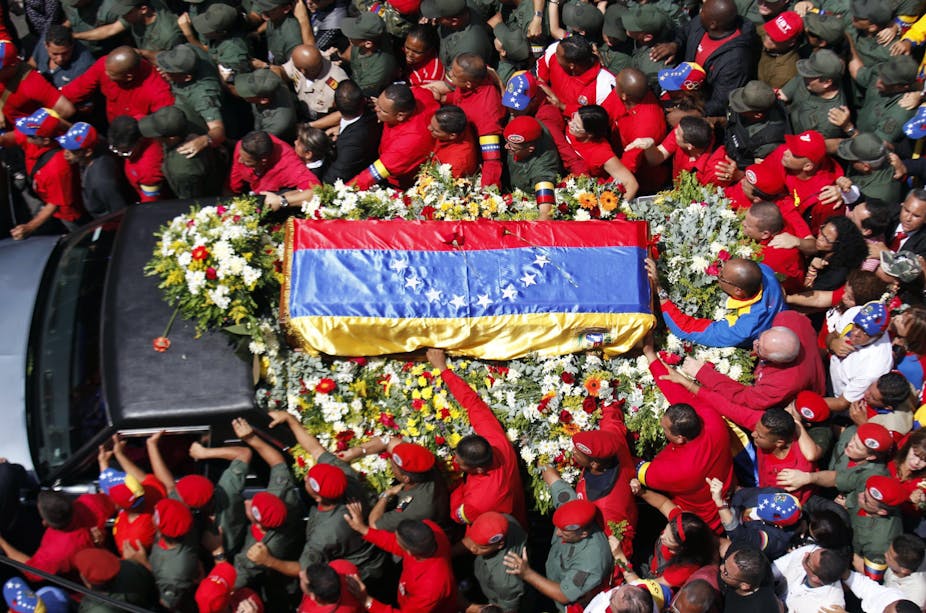The recent death of Venezuelan president Hugo Chavez from cancer comes as no great surprise. The former military leader had rarely been seen in the public eye since December last year when he travelled to Cuba for surgery, and premature rumours about his death have been circulating for months.
But his shadow now looms large over South America, standing with the likes of famous Latin American leaders like Che Guevara, Juan Peron and Fidel Castro.
While Chavez polarised opinion, it is difficult to think of a Venezuela without him. He changed the country and the region, and his legacy will endure for decades to come.
But with one of its most important leaders now gone, what’s next for Venezuela’s relationship with the region and the wider world?
Latin unity
Hugo Chavez famously baited the United States while at the same time promoting a united and independent Latin America.
He spearheaded the construction of the Bolivarian Alliance for the Peoples of Our America (ALBA), as a counterweight against the United States Free Trade Area of the Americas.
He also saw the entry of Venezuela to, and the strengthening of, the Southern Common Market (MERCOSUR). He was the first to push for regional economic independence and helped Venezuela to move away from previous governments’ free-market, pro-US positions.
Yet this is not to say that the other nations fell into line around Chavez. Although there has been broad support, there have been numerous foreign policy disagreements, particularly with larger nations like Brazil which can hold their own in the geo-political scene.
But one theme that remained amongst the loose alliance was Latin American unity, suggesting that even with the loss of Chavez, ties and trade in Latin America will continue on as usual.
Venezuela’s good fortune to own some of the largest untapped oil reserves in the world has led to a form of “oil diplomacy”. With this ability to send cheap oil to nations friendly to Venezuela and also with the capacity to threaten nations such as the US with an oil price rise, the Venezuelan government has been able to position itself as an important player in international affairs. In fact, the US imports more crude oil annually from Mexico and Venezuela than from the entire Persian Gulf.
The Chavez led government has seen newly strong relations with China, a relationship both parties would want to see continue – with oil for China and cheap credit for Venezuela. But the oil has also led to some less than savoury diplomatic ties with former Libyan dictator Muammar Gaddafi and Iranian leader Mahmoud Ahmadinejad, which Chavez’s successor may choose not to follow.
What now?
In the immediate future, the constitution calls for an election within 30 days, and it is most likely that Chavez’s appointed heir and Vice President Nicholas Maduro will win comfortably.
Maduro has been a close confidant of Chavez and appears to want to continue the Chavista Bolivarian socialism line.
Diplomatic relations with the United States then are unlikely to improve. The State Department and President Obama himself made a number of hostile statements during Chavez’s last months of illness, indicating that no matter who takes over power, there is not much interest on Washington’s part in improving relations.
After the death of Chavez, Obama released a vague written statement saying that “the United States remains committed to policies that promote democratic principles”, with other members of the US parliament being more openly antagonistic.
On Venezuelan soil, Vice President Maduro has very recently said he would expel the American ambassador for attempts to destabilise the country, repeating claims of a US conspiracy to “infect” Chavez with cancer.
In the more unlikely event of an opposition win, international relations will naturally shift. But due to the independence of neighbouring countries, much will remain the same in the immediate region.
However it is the smaller nations of Central America and the Caribbean, who have become somewhat dependent on cheap Venezuelan oil, that will be the largest affected, possibly drastically so. In addition one would expect diplomatic ties with the United States, and neighbouring Colombia to be repaired, along with the possible building of free trade agreements.
The more things change…
Whichever way it goes, Chavismo will remain the strongest political force in Venezuela for at least decades to come.
In addition to being the country with the largest untapped oil reserves in the world, Venezuela will continue to play global significance. And if Chavez’s political party retains power, we can expect a status quo foreign policy.
It may be as Bolivian president Evo Morales has said, “Chavez is more alive than ever”.

